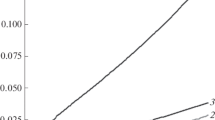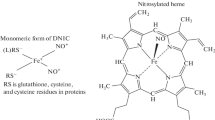Abstract
The binding parameters of hematoporphyrin, a photosensitizing drug used in photodynamic therapy, interacting with myoglobin, an oxygen storage protein, have been studied spectrofluorometrically and spectrophotometrically. Two concentration ranges of hematoporphyrin, representing significantly monomeric and aggregated (dimeric) states have been used. The binding affinity constant (K) decreases and the possible number of binding sites (p) increases as the porphyrin changes from significantly monomeric state to predominantly dimeric state. Titration of the protein with hematoporphyrin in a spectrophotometric study (differential spectroscopy) exhibits an isosbestic point indicating a ground state complex formation. The interaction leads to a conformational change of the protein as observed in a circular dichroism study. The hematoporphyrin-myoglobin interaction causes oxygen release from the protein and it varies with the stoichiometric ratio of the porphyrin:protein. Hematoporphyrin also increases the myoglobin-catalysed hydrogen peroxide-mediated oxidation of o-dianisidine and NADH. These findings on the effects of hematoporphrin-myoglobin interaction should be given due consideration in therapeutic uses of the porphyrin and its derivatives.
Similar content being viewed by others
References
Kessel D: Hematoporphyrin and HPD: Photophysics, photochemistry and phototherapy. Photochem Photobiol 39: 851–859, 1984
Penning LC, Dubbelman TM: Fundamentals of photodynamic therapy: Cellular and biochemical aspects. Anticancer Drugs 5: 139–146, 1994
Benzdemaya L, Zeghari N, Belitchenko I, Barberi-Heyob M, Merlin JL, Potapenko A, Guillemin F: Spectroscopic and biological testing of photobleaching of porphyrins in solutions. Photochem Photobiol 64: 382–386, 1993
Dougherty TJ: Photodynamic therapy. Photochem Photobiol 58: 895–900, 1993
Stables GI, Ash DV: Photodynamic therapy. Cancer Treat Rev 21: 311–323, 1995
Reynolds T: Photodynamic therapy expands its horizons. J Natl Cancer Inst 89: 112–114, 1997
Fisher AM, Murphree AL, Gomer CJ: Clinical and preclinical photodynamic therapy. Lasers Surg Med 17: 2–31, 1995
He XY, Sikes RA, Thomsen S, Chung LW, Jacques SL: Photodynamic therapy with photofrin II induces programmed cell death in carcinoma cell lines. Photochem Photobiol 59: 468–473, 1994
Ahmed N, Feyes DK, Agarwal R, Mukhtar H: Photodynamic therapy results in induction of WAF1/CIP1/p21 leading to cell cycle arrest and apoptosis. Proc Natl Acad Sci USA 95: 6977–6982, 1998
Kessel D: Porphyrin-lipoprotein association as a factor in porphyrin localization. Cancer Lett 33: 183–188, 1986
Jain V: Mechanisms and metabolic modulation of photosensitization. In: V. Jain and H. Goel (eds). Selected Topics in Photobiology. Indian Photobiological Society, New Delhi, 1992, pp 130–147
Ricchelli F, Gobbo S, Jori G, Salet C, Moreno G: Temperature-induced changes in fluorescence properties as a probe of porphyrin microenvironment in lipid membranes 2. The partition of hematoporphyrin and protoporphyrin in mitochondria. Eur J Biochem 233: 165–170, 1995
Beaton S, McPherson RA, Tilley L: Alterations in erythrocyte band 3 organization induced by the photosensitizer, hematoporphyrin derivative. Photochem Photobiol 62: 353–355, 1995
Bolodon VN, Krut'ko IV, Rozin VV, Chernitski EA: Effect of erythrocyte membrane structure on the dose dependence of photohemolysis. Biofizika 41: 413–416, 1996
Hirsch RE, Lin MJ, Pulakhandam UP, Nagel RL, Sandberg S: Hemoglobin oxygen affinity is increased in erythropoietic protoporphyria. Photochem Photobiol 57: 885–888, 1993
Hirsch RE, Lin MJ, Park CM: Interaction of zinc protoporphrin with intact oxyhemoglobin. Biochemistry 28: 1851–1855, 1989
Sil S, Chakraborti AS: Comparative studies on the interaction of protoporphyrin with hemoglobin and myoglobin. Ind J Biochem Biophys 33: 285–291, 1996
Sil S, Kar M, Chakraborti AS: Studies on the interaction of hematoporphrin with hemoglobin. J Photochem Photobiol B: Biol 41: 67–72, 1997
Patel RP, Svistunenko DA, Darley-Usmar VM, Symons MC, Wilson MT: Redox cycling of human methemoglobin by H2O2 yields persistent ferryl iron and protein based radicals. Free Radic Res 25: 117–123, 1996
Giardina B, Messana I, Scatena R, Castagnola M: The multiple functions of hemoglobin. Crit Rev Biochem Mol Biol 30: 165–196, 1995
Sil S, Kar M, Chakraborti AS: Haematoporphyrin enhances the peroxidase activity of hemoglobin. J Porphyrins Phthalocyanines 4: 168–174, 2000
Stryer L: In: Biochemistry, 4th edn. W.H. Freeman and Co., New York, 1995, pp 147–178
Margalit R, Shaklai N, Cohen S: Fluorimetric studies on the dimerization equilibrium of protoporphyrin IX and its haematoderivative. Biochem J 209: 547–552, 1983
Karns GA, Gallagher WA, Elliot WB: Dimerization constants of water-soluble porphyrins in aqueous alkali. Bioorg Chem 8: 69–81, 1979
Smith GJ, Ghiggino KP: The photophysics of hematoporphyrin dimers or aggregates in aqueous solution. J Photochem Photobiol B: Biol 19: 49–54, 1993
Sconfienza C, Van de Vorst A, Jori G: Type I and type II mechanisms in the photooxidation of L-tryptophan and tryptamine sensitized by hematoporphyrin in the presence and absence of sodium dodecyl sulphate micelles. Photochem Photobiol 31: 351–357, 1980
Witenberg JB, Wittenberg BA: Preparation of myoglobin. In: E. Antonini, L. Rossi-Bernardi, E. Chiancone (eds). Methods in Enzymology, vol 76. Academic Press, New York, 1981, pp. 29–42
Huang TH, Redfield AG: NMR study of relative oxygen binding to the alpha and beta subunits of human adult hemoglobin. J Biol Chem 251: 7114–7119, 1976
Geraci G, Parkhurst LJ: Circular dichroism spectra of hemoglobins. In: E. Antonini, L. Rossi-Bernardi, E. Chiancone (eds). Methods in Enzymology, vol 76. Academic Press, New York, 1981, pp. 262–275
Chen YH, Yang JT, Martinez HM: Determination of secondary structure of proteins by circular dichroism and optical rotatory dispersion. Biochemistry 11: 4120–4131, 1972
West JB: In: Best and Taylor's Physiological Basis of Medical Practices. Williams & Wilkins, 1985, pp 546–571
Everse J, Johnson MC, Marini MA: Peroxidase activities of hemoglobin and hemoglobin derivatives. In: J. Everse, K.D. Vandegriff, R.M. Winslow (eds). Methods in Enzymology, vol 231. Academic Press, New York, 1994, pp 547–561
Kapp EA, Daya S, Whitley CG: Protein-ligand interaction: interaction of nitrosamines with nicotinic acetylcholine receptor. Biochem Biophys Res Commun 167: 1383–1392, 1990
Rosenberger V, Margalit R: Thermodynamics of the binding of hematoporphyrin ester, a hematoporphyrin derivative-like photosensitizer and its components to human serum albumin, human high-density lipoprotein and human low-density lipoprotein. Photochem Photobiol 58: 627–630, 1993
Kongshaug M, Moan J: Separation of lipoproteins, albumin and gammaglobulin by single-step ultracentrifugation of human serum. Int J Biochem Cell Biol 27: 371–384, 1995
Rotenberg M, Cohen S, Margalit R: Thermodynamics of porphyrin binding to serum albumin: Effects of temperature, of porphyrin species and of albumin carrier fatty acids. Photochem Photobiol 46: 689–693, 1987
Timmins GS, Davies MJ: Conformational changes induced in bovine serum albumin by the photodynamic action of hematoporphyrin. J Photochem Photobiol B: Biol 24:117–122, 1994
Van Steveninck J, Boegheim JP, Dubbelman TM, Van der Zee J: The mechanism of potentiation of horse radish-catalysed oxidation of NADPH by porphyrins. Biochem J 242: 611–613, 1987
Van Steveninck J, Boegheim JP, Dubbelman TM, Van der Zee J: The influence of porphyrins on iron-catalysed generation of hydroxyl radicals. Biochem J 250:197–201, 1988
Sil S, Chakraborti AS: Protoporphyrin IX potentiates horse radish peroxidase-catalysed oxidation of NADH: Involvement of enzymeporphyrin interaction. Biochem Mol Biol Int 42: 759–768, 1997
Takayama K, Nakano M: Mechanism of thyroxin-mediated oxidation of reduced nicotinamide adenine dinucleotide in peroxidase-H2O2 system. Biochemistry 16: 1921–1926, 1977
Balagopalkrishna C, Abugo OO, Horsky J, Manoharan PT, Nagababu E, Rifkind JM: Superoxide produced in the heme pocket of the β chain of hemoglobin reacts with the β 93 cysteine to produce a thiol radical. Biochemistry 37: 13194–13199, 1998
Author information
Authors and Affiliations
Rights and permissions
About this article
Cite this article
Sil, S., Chakraborti, A.S. Hematoporphyrin interacts with myoglobin and alters its functions. Mol Cell Biochem 237, 103–110 (2002). https://doi.org/10.1023/A:1016595402925
Issue Date:
DOI: https://doi.org/10.1023/A:1016595402925




